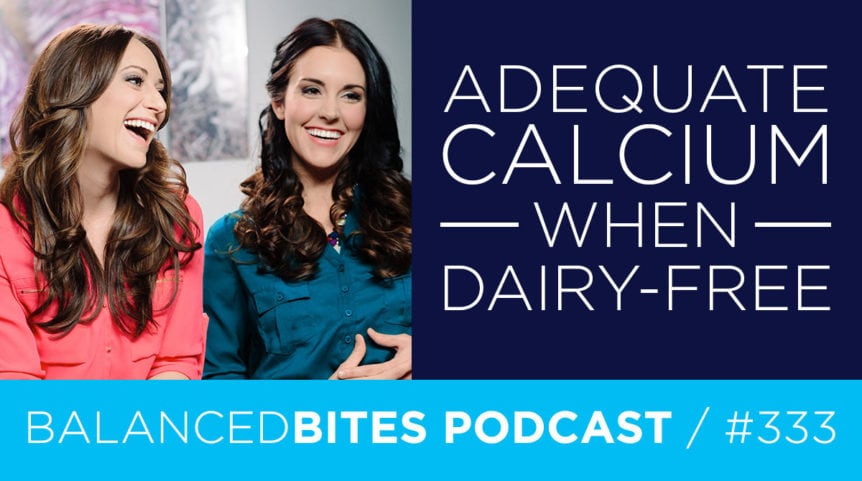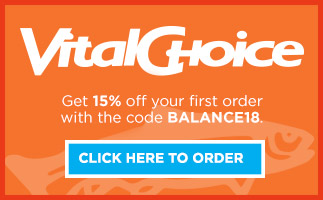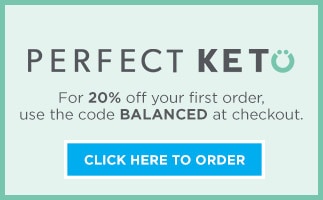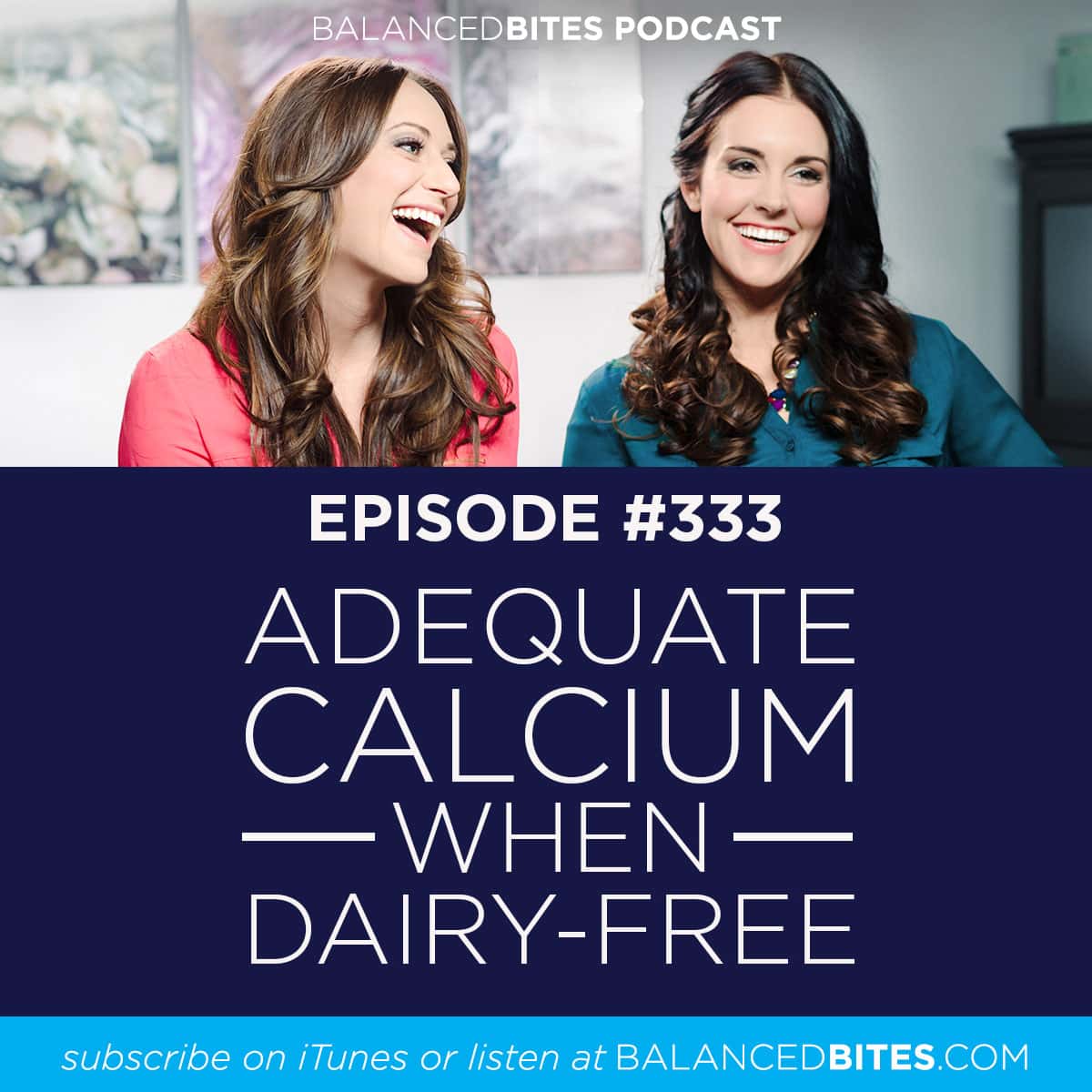 Topics
Topics
- News and updates from Diane & Liz [2:12]
- Listener comment: You saved my dad [4:09]
- Throwing out the good with the bad [20:32]
- Dairy's nutrient density [27:40]
- Last night's dinner [39:55]
Subscribe to DianeSanfilippo.com
The episodes are also available in iTunes, Spotify & Stitcher.
![]()
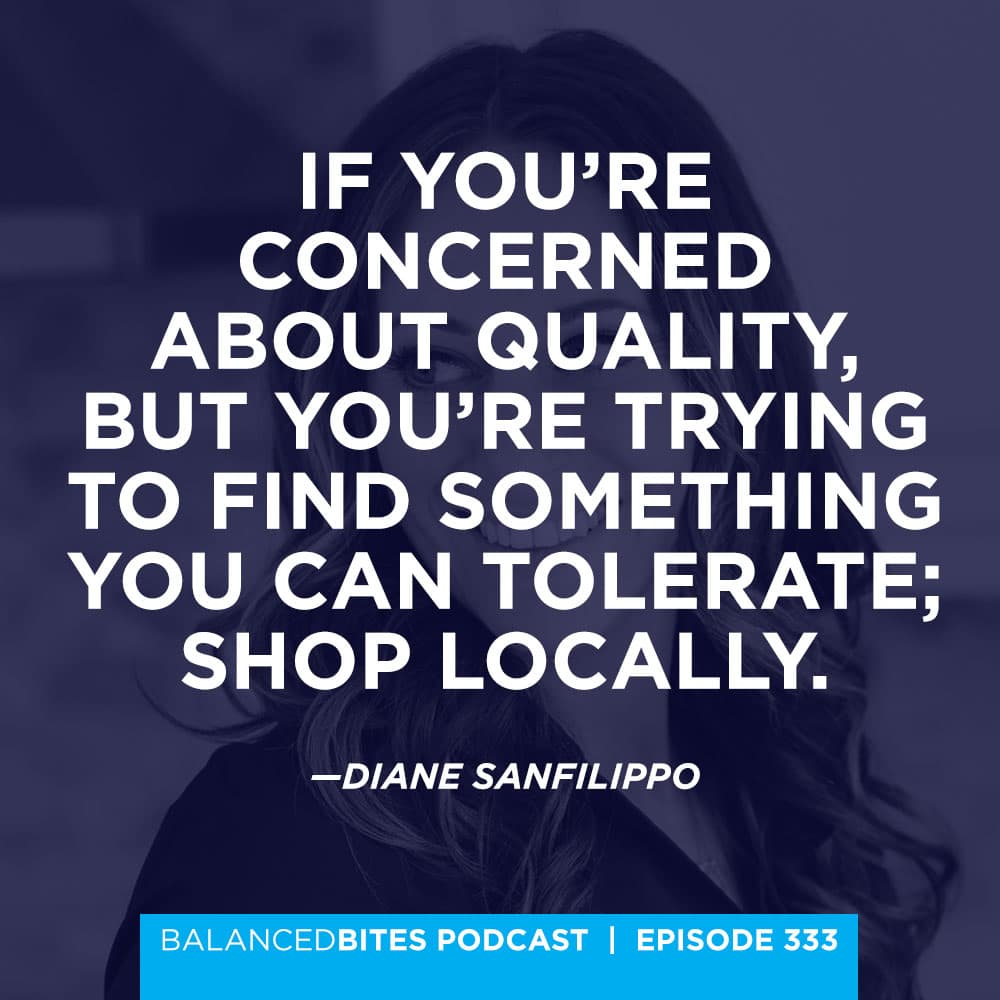
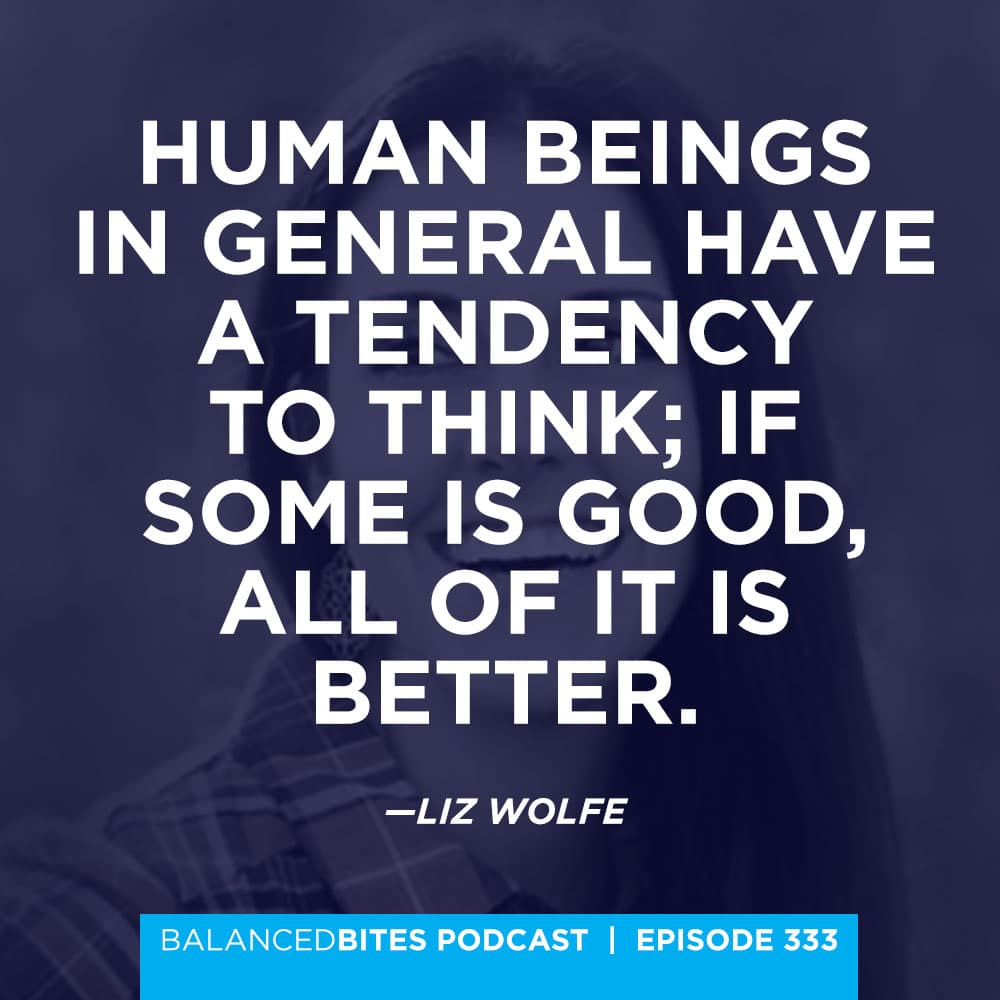
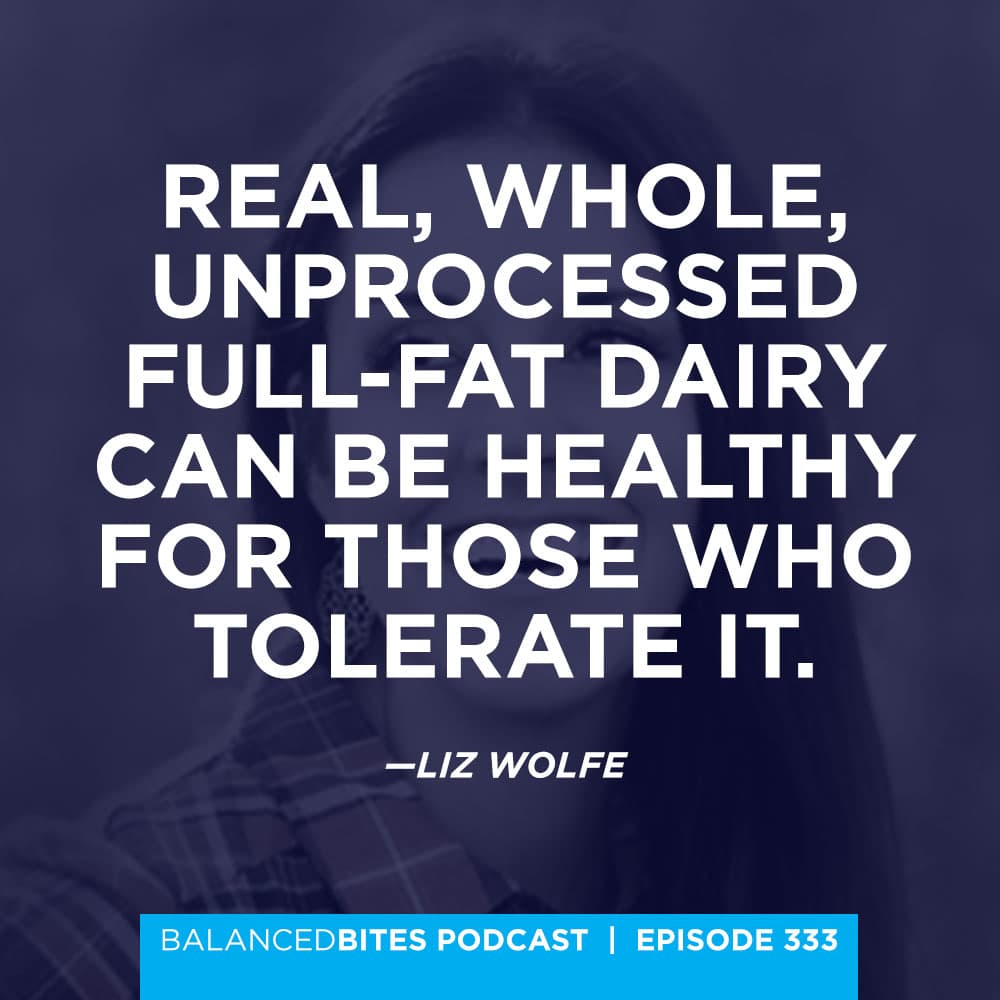
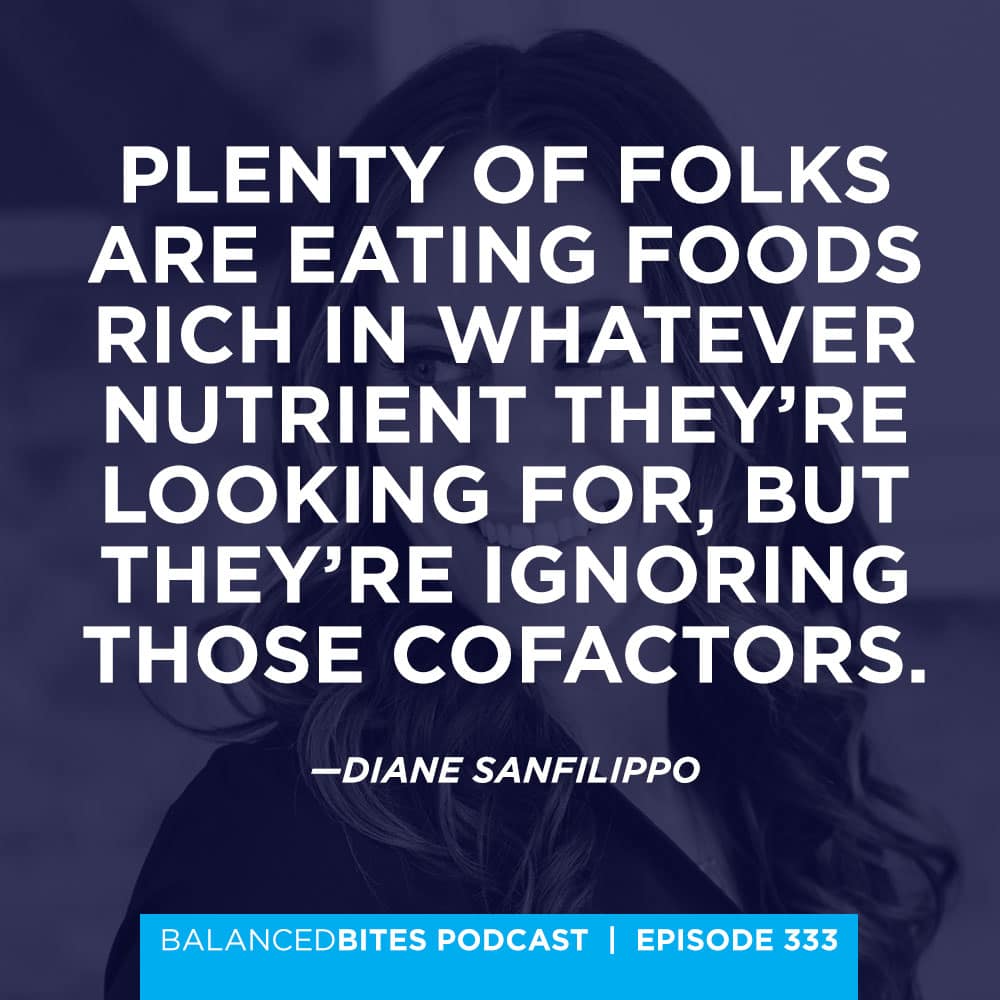
You’re listening to the Balanced Bites podcast episode 333.
Diane Sanfilippo: Welcome to the Balanced Bites podcast. I'm Diane; a certified nutrition consultant, and the New York Times bestselling author of Practical Paleo and the new book, The 21-Day Sugar Detox Daily Guide. I live in San Francisco with my husband and fur kids.
Liz Wolfe: I'm Liz; a nutritional therapy practitioner, and author of the Wall Street Journal best-seller Eat the Yolks; The Purely Primal Skincare Guide; and the online program Baby Making and Beyond. I live on a farm in the mystical land of the Midwest, outside of Kansas City.
We're the co-creators of the Balanced Bites Master Class, and we've been bringing you this award-winning podcast for more than 6 years. We're here to share our take on modern paleo living, answer your questions, and chat with leading health and wellness experts. Enjoy this week's episode, and submit your questions at http://blog.balancedbites.com or watch the Balanced Bites podcast Instagram account for our weekly calls for questions. You can ask us anything in the comments.
Remember our disclaimer: The materials and content within this podcast are intended as general information only, and are not to be considered a substitute for professional medical advice, diagnosis, or treatment. Before we get started, let's hear from one of our sponsors.
Liz Wolfe: The Balanced Bites podcast is sponsored in part by the Nutritional Therapy Association. The NTA trains and certifies nutritional therapy practitioners and consultants (including me; I'm an NTP), emphasizing bio-individuality and the range of dietary strategies that support wellness. The NTA emphasizes local, whole, properly prepared nutrient dense foods as the key to restoring balance and enhancing the body's ability to heal. The NTA‘s NTP and NTC programs empower graduates with the education and skills needed to launch a successful, fulfilling career in holistic nutrition. To learn lots more about the NTA‘s nutritional therapy programs, go to http://www.NutritionalTherapy.com. Registration for our February NTP and NTC classes closes soon, so if you've been thinking about enrolling, now is the time. There are workshop venues in the US, Canada, and Australia, and a brand new NTC venue in Vancouver, Washington. So chances are you'll be able to find a venue that works for you.
1. News and updates from Diane & Liz [2:12]
Liz Wolfe: Ok. Hi, Diane! What's up with you this week?
Diane Sanfilippo: What's up? On a little book tour hiatus. Because, as I mentioned in a previous episode, I wanted to wait a little bit to head out to the Pacific Northwest to be able to celebrate my friend, Robyn's, new book with her. So, I'll be heading up there to Portland, Seattle, and Tacoma February 8th, 9th, and 10th I believe are the event dates. I'm like; uh, what day are those?
I'm actually just double checking my event schedule. Oh no, I lied. {laughs} February 9th, 10th, 11th. I'm flying up on the 8th. So February 9th, 10th, and 11th; Portland, Seattle, and Tacoma. And yeah, I would love to see you guys there. I always love heading up there and it's going to be a really fun time. So that's kind of the big update and what's coming.
What about you? Pretty much {laughs} seems like we've got a joint update.
Liz Wolfe: Yeah. Well, all I have is it's negative 50 million degrees in Kansas City. It's actually just; the weather is totally back and forth. Which can be really hard on livestock, actually. A lot of people don't know that. Cows are really; livestock can be really cold tolerant, but it's the fluctuations in temperatures that are really difficult. So we went from in the 40s, up to the 50s, and then back down to negative 4. So it's tough on those guys, which is a bummer.
But, I think the one announcement that I wanted to talk about is just folks sign up for our NTA conference workshop that we're doing on Thursday, March 1st, 2018 as kind of an opener to the Nutritional Therapy Association‘s conference this year. It's going to be really exciting. It's a business building workshop that you and I are doing together, and it should be really cool.
Diane Sanfilippo: Can't wait.
2. Listener comment: You saved my dad [4:09]
Liz Wolfe: Alright, so I'm about to read a listener email that Diane received. This is a tearjerker listener feedback of the episode. “I think you may have saved my dad's life. To give a little background, I've been listening to your podcast for probably 5 years or more. I've dabbled off and on with eating paleo, and crossfitting, and I've really enjoyed yours and Liz's insights on overall life in general and the instastories of Harper and Mason.
I've struggled with my weight since probably around age 22. I'm 29 now, and have been told I'm very close to being pre-diabetic. My parents have both struggled with their weight as adults, but the last few years seem to have it fairly dialed in. Around 2001, or 2002, my dad was diagnosed with high cholesterol and pre-diabetes. His triglycerides were the highest his doctor had ever seen. He was put on medication, and he changed his diet and things got slightly better, but of course, never to normal levels.
My dad's father passed away from non-alcoholic liver cirrhosis 6 years ago. He had diabetes for as long as I can remember, and suffered from other health issues. I listened to the podcast with Dr. Jason Fung in June, and something really clicked. I've heard about keto many times; partially from the podcast, but never anything about fasting. Or how keto could help beyond just losing weight. When Dr. Fung talked about diabetes and how insulin can cause issues with many other organs, including the liver, I felt something I hadn't felt before.
I'd also heard from my parents that my dad's liver enzymes were high in his last blood work results, and he was going to have an ultrasound to check things out. After the podcast, I ordered the Obesity Code, and everything made so much sense to me. The whole time I was reading the book, I couldn't stop thinking about how I should share with my parents.
I knew that I couldn't come in hot saying, “eat all the butter.” The day I finished the book, my mom called and said my dad's ultrasound results came back and he has a fatty liver, and he has a dark spot they weren't sure about. I knew this was my opportunity. I told them about the book, and Dr. Fung, and they were immediately interested to hear that there was a way to possibly heal his body, and that there was hope.
My mom ordered the book, and my dad spent the entire next evening reading the links I had sent; not even watching the football game. They jumped in with both feed in mid-October. He had an MRI just before Thanksgiving, and they couldn't see the spot on his liver. And overall, things looked fairly normal. Since that didn't match the ultrasound results, they wanted to do a more intense MRI. That happened the first week in December, with the same results. Nothing seemingly out of the ordinary.
Today my dad got his blood tests results back; and holy cow, now I understand why things looked totally different. His last blood test was done the beginning of October, and his LDL cholesterol was so high it couldn't be measured, so the test showed greater than 400. It was now down to 108. His triglycerides when from 478 to 218, and his blood glucose is now in the normal range. Liver enzymes were also back to normal. Also, he was no longer showing pre-diabetic. After only two months of intermittent fasting and keto, we all can't believe.
I myself am down 8 pounds, and haven't even measured how many inches off my waist. But I can tell you my pants fit way better, and are getting loose. The best part for me is I feel better. I finally have the energy I used to, and my mind is so much clearer. Sorry that story is long, but I felt it was needed to show just how grateful I am for everything you do and sharing the information you have, and allowing people to take that information and to make their own decision based on that information. So again, thank you.
Also, thank you for sharing Beautycounter. I'm in love.”
Diane Sanfilippo: So.
Liz Wolfe: Amazing!
Diane Sanfilippo: Danielle, I know. I mean, sometimes we do different podcast episodes. And we know; I knew that the information that Dr. Fung was sharing was life changing for his patients. And I knew that a lot of our listeners would value it. But you really never know where it's going to go beyond that. Do you know what I mean? The vast majority of our listeners are not the same type of folks who are his patients. But her parents were. And maybe she was. And it's the kind of thing where; if it helps one person. If it helps two people, it's worth any amount of time. Anything that we do to get the information out there. And as much, Liz, you and I kind of go back and forth on the idea of keto or low-carb, or who should be fasting or who shouldn't be fasting. It doesn't matter. There's something different for everyone, and this family has been helped by this.
Not only is it obviously so life changing for them, it's opened the door for them to continue learning about what may work for them now and in the future. It's opened their minds up. We all would probably agree; you and I and everyone listening, that if anything we do with our work or show or books; our teaching helps an immediate family member, that's really all we could ever ask for. You know what I mean?
Liz Wolfe: Yeah.
Diane Sanfilippo: It's like; I'm happy to help all the people that we help. Truly. But if my dad or my mom were helped by something; there's no greater gift than to help our immediate family and our loved ones. So when this email came in; I was probably; I don't know. I was probably in post-book writing stress mode and it just; thank you, Danielle, for writing the email and for letting both of us know what it is that the show has done for you and your family. And I think that that is the kind of thing that just really gets us going. It helps us to keep doing the show and keep talking about different topics. And sharing the information, because that's really what it's all about.
This transformation is amazing, and if you're listening and you think that your parents could be helped by hearing this story of Danielle and her family. If you know anyone that could be helped by it, please share it with them. Let them listen, and let them hear her story. It's not our opinions that are what's making the difference. It's how our education, experience, and opinions and what we share through the show changes people's lives that then impact other people in a more profound way. Do you know what I mean? It's not just because we say something. It's because when something actually works for someone, it's life changing. And that is amazing.
So I'm so happy to hear this, Danielle. I'm so happy for you. Please tell your parents that we are so glad that they tuned in, and that they listened, and that they read the book. We hope to hear more from you in the future. So congratulations, and good job. You guys did the hard work, too. The hard work of opening your minds, and the hard work of actually making the changes in your life, and I just can't wait to see where you all go from here. So thank you for writing in.
Diane Sanfilippo: Today's podcast is sponsored by Perfect Keto. Dr. Anthony Gustin and his teams have created lines of supplements that are super clean and effective, no matter what your dietary needs. I recommend blending the MCT oil powder into your morning coffee, or decaf. Not only are MCTs, medium-chain triglycerides, a premium source of your body's preferred type of energy and help to fuel your brain and body, but there's also no added taste and it makes your coffee wonderfully creamy. Check them out at www.PerfectKeto.com and use the code Balanced for 20% off. And you can get 20% off of their sister products as well at www.EquipFoods.com.
3. Listener question: Dairy-free calcium intake [11:57]
Liz Wolfe: Today we are going to talk a little bit about calcium, and the best sources of calcium when going dairy free. So we'll start this conversation out with something that a listener wrote in. This is from Varsha Patel, MD. Love it when the MDs listen. “I'm curious about adequate calcium intake when dairy free. Calcium is so important for women, especially for bone health. I recently heard about juniper ash that a native American tribe cooks with that helps them have very strong bones, despite being largely lactose intolerant. This was on NPR. Clearly, juniper ash is not easily accessible. What other suggestions do you have aside from a multivitamin? Because I value getting adequate nutrients from food instead of pills.”
I wrote some thoughts on this. Diane, did you want me to jump in or do you have some thoughts?
Diane Sanfilippo: I would love to hear from you.
Liz Wolfe: Okie doke. Well, first of all I think it's really fascinating how various cultures have this ancestral wisdom that helps them plug certain holes in their dietary intake. This is a theme I've heard repeated in several different cultures. And it's just so fascinating. But yes, juniper ash is not readily available. And I would also probably argue that that's not the right approach to take. I think this is a very culturally specific dietary patch that maybe we should just; I don't know, leave alone.
But I know our culture loves importing things from other cultures that seem to work for them. But I don't know that that's the perfect approach. I think the normal everyday stuff that you can do; bring some extra awareness to your calcium intake. Learn a little bit about how calcium is used in the body. I think that is a much more sound tactic for making sure that you're getting what you need.
As far as calcium, I think what we now know; it's pretty clear that calcium without what we would call; I think maybe they use this language in other professions. But as holistic health, we would call them cofactors. Calcium without calcium cofactors. Which the ones we absolutely know about; and I'm sure there are more that we haven't even studied yet, are the fat-soluble vitamins A, D, and K2; magnesium, other trace minerals, essential fatty acids. If you don't have those cofactors, then calcium is not going to be used properly by the body anyway.
And these are the cofactors that are actually found in real food. Which is fortunate. But unfortunately, these are also the nutrients that are usually stripped out of a lot of modern dairy when they skim it. I do think most modern dairy is fortified to try to replace these nutrients. You have vitamin D milk, and I think vitamin A as beta carotene is often added to milk.
But I have no idea about the effectiveness of fortified nutrients serving in place of the natural cofactors we need. Especially when these nutrients, which are the nutrients that we need which are fat soluble, are added to fat-free dairy products. I don't know that they do the work that we think they do. So, I can't say with confidence that modern, processed, pasteurized, low-fat dairy necessarily does what we want it to do anyway.
We also know that isolated calcium supplementation has been shown to be largely worthless and possibly even harmful. And this is likely because; again, isolated calcium without cofactors means we're not giving our bodies the tools we need to use it in the first place. So it's literally laid down in our bodies inappropriately. And we do not want that.
So I do think that real, whole, unprocessed, full-fat dairy can be healthy for those who tolerate it. I wrote about dairy and calcium in Eat the Yolks. I think I might have even addressed the entire calcium question in Eat the Yolks. But I talk about why dairy is a useful food for people who can tolerate it. Why we started using it in the first place. It makes a whole lot of sense. We didn't start eating dairy just for no reason. There were reasons behind it. It is a dense source of nutrition. So if you can tolerate it, I don't think some dairy for calcium is a bad thing.
So, let's talk about the RDA for calcium, which I think is like 1000 mg for women that check our age box, Diane. So just do the math. Run your foods through a nutrient calculator and see where you are. I think a cup of cooked kale has a little more than 25% of your daily needs. An ounce of cheese has about the same. And an ounce of cheese is like nothing. A cup of raw milk has, I think, about a third of your needs. Sardines with the bones have like 200 mg. So figure out how to get what you need, and calculate what to eat.
And if you're really falling short, I feel like it's probably appropriate to supplement with eggshell calcium or coral calcium. Because those have some other nutrients in them, as well. And they're also natural sources of calcium.
But if you can strategize your diet to get calcium and essential fatty acids, and the fat-soluble vitamins, I think that would be ideal. I know a lot of folks come into the paleo diet, and kind of get this dogmatic view of dairy where it's like; dairy is not necessary. No other species drinks the mammary secretions of another species other than humans. And I'm like; yeah, well humans do a lot of things that other species don't do. So kind of looking at this big picture; what other nutrients do you need? What's best for you in getting them? And strategizing from there is probably the best approach.
Your thoughts?
Diane Sanfilippo: Yes. Well, I actually have a blog post on non-dairy calcium from 2011. {laughs} Which is crazy to me. Back when I was actually blogging. But if you want to look up different nutrient values in foods, where it's like; what's the nutrient and what are the foods that contain it. First of all, actually in Practical Paleo, I don't have percentages written down. But if you were looking for a specific nutrient and you want to see what foods contain it, if you check the meal plans in Practical Paleo, you would see if you're looking for choline, for example. Or anything else. You can see foods that contain it.
But WHFoods.com is a really good website. It's the World's Healthiest Foods. And you can check this out. Calcium is telling you what percentage of your DRI, or recommended daily value, you're getting from a serving of different foods. So as you mentioned, sardines are on there pretty high up, as well as some dairy. Yogurt, for example. And greens, as you mentioned.
But another one that people may not realize is sesame seeds. Although getting a large quantity of sesame seeds, aside from downing tahini. Which, you could do that with; I'm going to say, a tablespoon of tahini would include probably about half or a third as much. Actually it's about a third. A tablespoon of tahini has a third as much calcium as 100-gram portion of sardines. 100-gram portion of sardines is just under 3 ounces. It's a normal sized portion. But you can get it from sesame seeds, as well. So if you're doing tahini, that's another good source.
But you guys can check out this link. It's in FAQ, paleo diet, calcium, how will I get that. So yeah. I think the cofactors are super important too, because plenty of folks are eating foods rich in whatever nutrient they're looking for, but if they're ignoring those cofactors. Especially, those essential fatty acids and fat-soluble vitamins. I just think the fat-soluble vitamins are so tough to get from our food.
And I'm with you. If we can find a way to tolerate high quality dairy, I think we'd be right on to do that. Figuring out that I could tolerate goat and sheep milk dairy has been so great. And I think my health is only better for it. But I think that that's something that we all need to kind of figure out on our own.
4. Throwing out the good with the bad [20:32]
Liz Wolfe: I think the dairy question is so interesting, because I think just humans being in general have a tendency to think; if some is good, all of it is better. Or, if too much is bad, then we need none. We just go to these extremes. And I feel like in a lot of the research that we did around vitamin A and pregnancy, we know. We have some really good literature about vitamin A and pregnancy. But people heard that too much; like, way too much. More than any human being would eat on a normal day in modern life. Too much is bad, so we need none. When in reality, vitamin A is really, really important. And we need some.
And I think when we think about dairy, there's obviously the problem with how it's produced. That the cows are generally; up until the last 5 years when these products became available in the Natural Grocers and Whole Foods. But cows raised in confinement, fed the improper foods, and then the milk is high temperature pasteurized and homogenized and skimmed and reconstituted and all of that. Yeah, that's not good. That's not good when it happens to anything edible. That's basically a processed food.
But that doesn't mean that there's not something valuable in real milk. Like how people ate it for a very long time before it became a processed food. And I don't think we see people being intolerant to dairy, because all dairy, no matter what type, is a problem. It has to do with probably what we were fed as infants. I would imagine that folks that are formula fed might have a higher chance of developing dairy intolerance after that. That was certainly the case for me. I was formula fed, and had eczema from dairy growing up.
So, we just swing the pendulum a little too wildly in the other direction, and just kind of clear this entire; what could be a nutrient dense, good option, in moderate amounts, in normal quantities, we just completely take it off the table and throw the baby out with the bathwater. We don't need to be drinking a cup of milk at every meal, and having cheese and yogurt and copious amounts of dairy constantly all day long every day, but a serving of yogurt. An ounce of cheese. If you can tolerate it, there's no reason that I can think of not to go ahead and eat it.
Diane Sanfilippo: Yeah. I think; I wrote down what you said. It's so clear and obvious. But I don't know that everybody takes this to heart. Especially when it comes to things like Greek yogurt; which I have a real problem with in poor quality forms. But you said “conventional milk is a processed food.” And I don't think that people realize that.
Liz Wolfe: Yeah.
Diane Sanfilippo: I don't think they realize exactly how stripped down and rebuilt conventional milk is. It's a huge reason why when we talk about dairy, we're like; we want the stuff coming from; if it's grass-fed cows. Animals that are just well raised. I think if you pay attention to how the farm is running, and that entire process and understand whether or not the folks who are producing the products have respect for the product.
This came up when I was researching, and never finished my blog post because I'm the worst blogger on the planet. But I was researching about yogurt and Greek yogurt. And I talked to someone from Maple Hill Creamery. And they don't sell; at least at that time, and I don't think they still do now. Don't sell a non-fat or low-fat product. And I'm like; thank you. Because, they're aligned fully with what they're doing. Do you know what I mean? It's not just about raising the animals properly and producing it properly. It's; “We're then not going to strip it down just because that's what the masses think they should be buying, this nonfat, low-fat garbage. We are producing a quality product and that's what we do.”
And I think it's important to support those companies. Really support them, so that the products stay available as wildly as possible. Or support those folks who are locally making high quality yogurts and things like that. And cheeses that you can find at your farmer's market. If you're concerned about quality, but you're trying to find something you can tolerate; shop locally. Support the local farms that are not doing this big box operation that's not healthy for the animals, and not healthy for us either.
Liz Wolfe: So how did you figure out you could eat sheep's milk dairy? Were you just really missing dairy and determined to find something that would work?
Diane Sanfilippo: Testing. I mean, who isn't? {laughs}
Liz Wolfe: Right, yeah.
Diane Sanfilippo: Anybody who is eating dairy free, pretty much wants to eat cheese. If somebody doesn't want to eat cheese, then I don't know. Cheese is just the best. I love yogurt. I love that sourness. I love it. I think being able to eat yogurt and other hard cheeses; things that are fermented. We're not even talking about that in this conversation, but yogurt is a fermented food. It's an awesome fermented food, but not when it's junk quality. You know?
So I really wanted to find a way to bring this stuff back into my diet. And for me, milk, whether it's raw or not. I just cannot do cow's milk. I probably could do a lactaid one. It really is the lactose that bothers me, but I'm not going to be buying lactaid. That's just; no. That's not happening. Not a high-quality product to start with.
But, yeah. I just kept trying different things. Which is part of what we talk about all the time. You might not tolerate something now, but in three months or next year, try it again. Yeah, I really wanted to eat it. And I was in the camp of; look, dairy is a nutritious food. It's nutrient dense. It has nutrients we can find elsewhere, as we just discussed. But they're so readily available in high quality dairy that why not keep trying to find it if we can. So I just kind of went for it and kept testing.
For me, it's some digestive upset if I don't tolerate it, but also for sure acne. I cannot do whole butter without breaking out. At least not cow butter, but ghee is fine. So it's definitely a process of testing. And I do think it's worth doing that for anybody who is; not with a severe allergy to dairy proteins. But if you have an intolerance, I do think it's worth testing. All different kinds of animals; whether it's sheep, goat, etc., camel milk. Which is available. And different forms; whether it's yogurt, soft cheese, hard cheese, milk, etc.
5. Dairy's nutrient density [27:40]
Liz Wolfe: So, one of the objections that I also get when I talk about dairy is; people will say, “You like it so much because it's addictive. Dairy is addictive. It stimulates this cascade of addictive responses in the brain and in your body.” It feels that way sometimes, because I love it so much. But I think that is more an issue of; ok. Let me back out. I think our body responds positively to dairy for a reason. I think our body is primed to respond to things that we need in small amounts, such as sugar, carbohydrate. Because that stimulates signals of; eat as much as you can. Store this, because there's going to be famine later. Things like that. That type of physiology.
When things are really, really nutrient dense, and that would be something like dairy, I do think it makes sense for our body to say; more. Get more of that. Because there might not be any of that later. So the problem becomes not that it's addictive, but that we have too much of it available too much of the time, and we're not aware enough of why we feel that way and the utility of something like dairy to really moderate in a way that doesn't crowd out nutrition from other sources.
So when people say something's addictive; I'm always like; well is it really a problem of the substance itself? Or is a problem of availability, and how we view that particular food in our culture. That type of thing.
Liz Wolfe: Today's podcast is sponsored by Vital Choice seafood and organics. Purveyor of premium sustainably sourced seafood and a certified B corporation. Vital choice offers a wide range of fish, shellfish, humanely raised meat, protein rich bone broths, and paleo friendly snacks like organic dark chocolate, super antioxidant trail mix, and bison jerky. My favorites from Vital Choice are the salmon and the tanner crab. Diane's favorites are the king salmon, seaweed salad, and canned Ventresca tuna. Celebrate the new year, and your health, with premium seafood and organics from www.vitalchoice.com.
6. Last night's dinner [39:55]
Diane Sanfilippo: Alright. This segment is called; Last Night's Dinner. So let's talk about what we ate for dinner last night. Speaking of dairy; I actually had a dollop of dairy on top of a taco salad. So I had romaine salad, which I was trying to frantically Google whether or not our romaine could be affected by the E. coli outbreak in romaine lettuce. There's like a big deal with that; hopefully not. Although, my stomach is not feeling ideal today. Had some salsa chicken that Scott had made while I was away, topped it with some salsa, avocado, and a pretty good healthy dollop of a lactose-free sour cream.
So I was talking about dairy that I do and do not tolerate, and I seem to do ok with this lactose free sour cream. I don't know if that's partially because it's sour and fermented, so that takes off some of the lactose. Or if it's just lactose free in general. It is a lactose free brand. But I do ok with it. But it's high quality, and I love it. And that was dinner last night. It was pretty epic for a Monday night dinner. What did you have?
Liz Wolfe: I was wracking my brain while you were talking. I was like, what did I have? Ugh, I can't remember!
Diane Sanfilippo: Did you remember?
Liz Wolfe: What did I have? If it's not two feet in front of my face, it's not on my mind.
Diane Sanfilippo: Well mine was on Instagram. So I could remember it. {laughs}
Liz Wolfe: That's so smart. I literally, every day, I'm like; you need to post your food to Instagram! But I don't think about it. I don't know what the deal is, I just don't think about it. So last night, we had a Shepard's pie that Colleen made. #Colleenmadeit.
Diane Sanfilippo: Colleen made it! {laughs} I love it.
Liz Wolfe: Yeah. So it's got grass-fed ground beef, peas, carrots, I think she put some kale in there, or some kind of green. And we did the mashed potato topping. Anybody that ever says substitute potatoes with freaking cauliflower; no. Does not work for me. {laughs} So that's what we had.
And also, I've been eating; had Colleen make Cassy Joy's winter veggie salad with kind of a Thai flavored sauce we used sunbutter for it instead of almond butter. The recipe is on www.FedandFit.com. I think it's like a winter veggie slaw. But I had Colleen make that; a huge batch of it. So I've been taking a big giant plate of that almost every day, and just putting that yummy dressing on top, and just getting my veggies in. So that's been great.
Diane Sanfilippo: I love it.
Liz Wolfe: Yeah.
Diane Sanfilippo: I love it. That was a little hack that you shared in; was it a live Instagram video? Some kind of Instagram.
Liz Wolfe: Yes. It was a live video. It's been like a game changer. And it seems so simple. But I get really overwhelmed thinking about; oh, I need to eat veggies every day. What am I going to eat? What am I going to eat? I don't particularly love cooking vegetables and eating them all week. I just don't like reheated cooked vegetables. I don't know. Asparagus is good right after you cook it, but then it just gets all limp in the fridge.
Diane Sanfilippo: Yeah.
Liz Wolfe: So I've been really overwhelmed with that. Finally I was like; what am I doing? This is not hard. Chop a bunch of stuff up. Make a really simple oil and vinegar dressing. You've taught me how to make that. Like you said; add a little bit of Dijon mustard to keep the emulsion. Totally works; you just shake that up. It takes two seconds. Well, a little more than that.
And then the Instagram live I did; I totally should have put it on my permanent stories, and of course, I forgot to do that, as well. Why didn't you tell me to do that? You need to be on me about these things.
Diane Sanfilippo: I'm bossy enough at it is. I need to reign it in.
Liz Wolfe: Help me. So that first week I was doing kind of hearty vegetables; broccoli, carrots, cucumber. Stuff that can be drenched in dressing and kind of marinate and it just keeps getting better. We did those that first week, and then the following week we did Cassy Joy's winter veggie slaw. And just made the dressing separate. So just a big old thing of dressing on the side, and just pull from it all week.
There's probably a little bit of nutrient degradation over time. So one of the things that I've done is wait until I'm actually ready to eat it to chop it into smaller bits. Because I like a nice chopped salad. But you do lose nutrients, the more you chop your veggies. But I really think the point is just eating the dang veggies. I'm not going to let perfect be the enemy of the good there.
Diane Sanfilippo: Yeah. And when you say chop them; it's like, chop them, and then there's more surface area that's getting exposed to air. It's not just chopping them, for people who are like; wait a minute, what? Am I supposed to eat a head of broccoli whole? It's like, the prechopped stuff at the grocery store; a little bit lower in nutrients than a head of broccoli that you chop and then use. But let's not let that get in the way of us eating the vegetables.
Really, this is a really interesting approach. Because when I was first studying holistic nutrition; I don't know, probably more than 10 years ago now, one of the instructors was Dr. Dan Khalish, who has his own functional medicine program now and all kinds of stuff. And I remember it was a hack that he talked about. Where he would take tons of different veggies, like carrots, and beets, and probably cucumber or zucchini or something, and shred it all. And then have that for a couple of days in a big bowl, like you're describing. But all shredded.
So it was kind of; and maybe broccoli. The stuff that's kind of tougher to eat raw if it's big. But he would just shred it all up, and then throw some kind of protein on top of it. And then it's super easy to eat. Probably really fun, if you were trying to feed this to your kids, also. And you could do this with different colored stuff, like purple cabbage and carrots and beets and all that. And it would get all fun colors. So that would be a really interesting thing to do too just using your food processor. Once you have it out, just kind of put everything through there. But that's another good one, too.
I love this idea. I might try this soon, when I'm home for a good stretch. I might do that. I like that. It's a good idea.
Liz Wolfe: That's it for this week. You can find me, Liz, at http://realfoodliz.com/ and you can find Diane at http://dianesanfilippo.com. Join our email lists for free goodies and updates that you don't find anywhere else on our website or on the podcast. While you're on the internet, leave us an iTunes review. See you next week.

